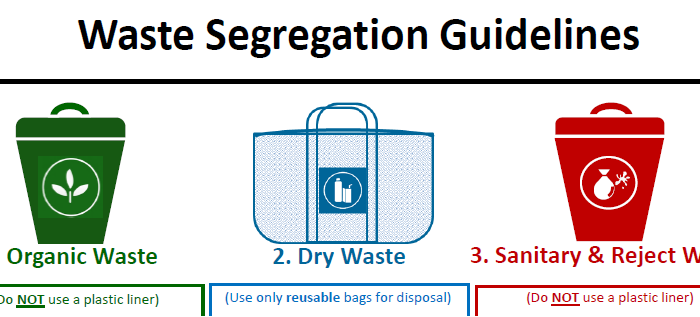"जब तक आप अपनी समस्याओं एंव कठिनाइयों की वजह दूसरों को मानते है, तब तक आप अपनी समस्याओं एंव कठिनाइयों को मिटा नहीं सकते|"
Success story of Bengaluru
Citizens
take the initiative
Efforts by people and
backing of the administration have scripted success stories Bengaluru
has a tradition of home and community garbage management. It has a vibrant
terrace gardening culture. There are 5,000 terrace gardens in the city, all
of which are based on home composting, says B N Vishwanath of non-profit
Organic Terrace Gardens. Initiatives such as My Clean Malleshwaram (MCM) in
the locality have been creating awareness on the need to segregate and manage
wet waste at the community level. The landfill crisis of 2012 gave a fillip
to such initiatives and people’s awareness on the need to segregate has
increased. Poonam Kesari of Daily Dump, which sells home and community
composting equipment, says that since the crisis, 15,000 home composting
units and 100 community composters have been sold in the city. “There is more
awareness across the board, and residents’ welfare associations (RWAs) are
now more willing to help,” she says. Malleshwaram is a classic example of
waste management by people with help from the administration. With the joint
effort of MCM, local MLA C M Ashwath Narayan and BBMP, at least half of
Malleshwaram’s waste is being segregated at source. “We started about eight
years ago, but new laws and backing from the MLA have been an enormous
boost,” says V N Sandhya of MCM. “Some six months ago, we started focusing on
door-to-door collection. We drew up maps for 10 out of the 20 blocks in the
ward so that the exact collection area of each garbage collecting auto was
defined. The collectors were made accountable for visiting each house daily.
We also authorised garbage collectors to refuse to collect unsegregated
waste.” Work in the remaining 10 blocks will begin in a few months. This, she
says, has empowered people and garbage collectors, and brought down garbage
dumping on the streets by 60 per cent. Malleshwaram is also perhaps the only
ward where sanitary waste is collected separately. At least 1.2 tonnes
monthly is disposed of at an incineration facility at a local hospital. About
eight tonnes of wet waste is sent to Karnataka Compost Development
Corporation for composting every two to three days. Former waste picker I
Ambika, who runs Malleshwaram’s dry waste collection centre, says the centre
receives 18 tonnes of waste per month, most of which comes from garbage
collectors. She employs four waste segregators, and at the end of the day,
Ambika and her husband Ayappan earn `300 each as wage. Community composting
is being done with great vigour in apartments. In Someshwarapure locality,
residents of Salarpuria Cambridge Residency have set up a wet waste
composting plant at a cost of `1.5 lakh with help from Daily Dump. “All 55
families in the building are now segregating waste. The compost is used in
the common garden or sold to residents and neighbours for their personal
gardens,” says Shraddha Prabhu Kumar, president of the RWA. “The maintenance
cost is just about `4,500 per month, which comes to less than `100 per
family.” Eighty per cent of garbage segregation problem can be managed at
source if all apartments in the city are retrofitted with community
composters, says Kesari. “It would be a much quicker and cheaper solution
than some of the huge facilities being set up by BBMP.” Ramakanth, who has a
small biogas plant and a terrace kitchen garden in his house, says, “One of
the recommendations of the expert committee set up by the Karnataka High
Court was to exempt domestic biogas plants from VAT and provide soft loans,
but that has not been done.”
|
Why is Segregation important??????
Segregation is important because :
1. If the waste is not separated properly, it all gets mixed
up in landfills. The dangers of this is that they all leak after a period of
time, resulting in leachate or toxic soup at the bottom, which can contaminate
ground water and release explosive methane gas.
2. Methane is a green house gas, which ultimately leads to
climate change, extreme climates and droughts. We can see the impact already in
the world.
3. Segregation protects health. When ragpickers put their
hands into the waste to clean it up, it results in cuts that further leads to
infections, resulting deterioration of a ragpicker’s health. Hence, it becomes
our responsibility to help these ragpickers by carefully segregating the waste
that is generated at our homes. • When the waste is not separated properly it
leads to less recycling because it is not easy to remove materials for
recycling.
4. Bio-Degradable Waste (Organic Waste or Kitchen
Waste) • Vegetable , Fruits , Flowers , Leaves from garden,
Wood shavings, pencil shavings
5. Non-Bio Degradable Waste • Plastics • Paper
• Glass • Metal • Frooti , and other tetrapacks • Ponche ka purana kapra •
Aluminium foil
Thanx to Mr. Gulshan,
President-Palam Appt and Mr. Nangia, Secretary-Palam Appt for conducting this
workshop for the betterment of society. Residents were enthusiastic after learning
method at indivdual and community level.
इस दुनिया में असंभव कुछ भी नहीं| हम वो सब कर सकते है, जो हम सोच सकते है और हम वो सब सोच सकते है, जो आज तक हमने नहीं सोचा|
































